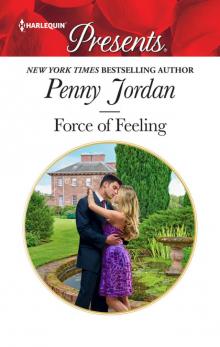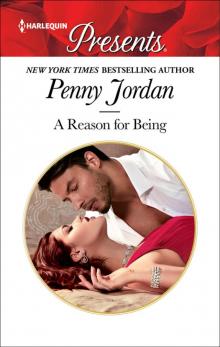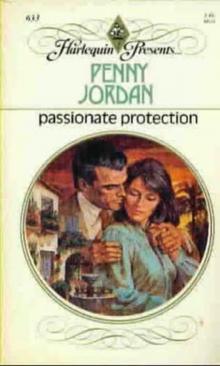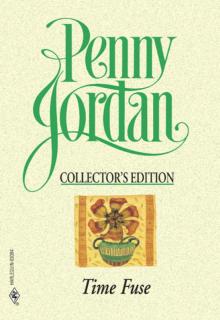- Home
- Penny Jordan
Giselle's Choice Page 3
Giselle's Choice Read online
Page 3
‘I understand,’ she told him, unable to resist adding ruefully, despite her good intentions, ‘I just hate us being apart so much. You’ll have to blame yourself for that, for making me so happy.’
Saul smiled down at her. ‘That’s a two-way street, you know. You make me happier than I ever imagined I could be, and that only makes me feel even more guilty about Aldo. We both know that his marriage can’t have brought him anything like the happiness we share. There was never any real emotional commitment or closeness between him and Natasha.’
‘He loved Natasha but I don’t think she loved him in the same way.’
‘Our relationship is built on mutual honesty and trust. I know you would never conceal anything from me. I doubt very much that Aldo could ever have said that about Natasha.’
Giselle rested her head on Saul’s shoulder, her heart thumping with the guilt that thudded through her. She had kept something concealed from Saul. But it was nothing he needed to know, nothing that affected her love for him. In fact, if anything, what she hadn’t told him only made her love for him stronger and deeper, because their shared decision not to have children meant that what she hadn’t told him need not matter.
‘I love you so much,’ she told him now. ‘Our life together is everything I hoped it would be and more.’
‘I agree. You are the best, Giselle. You bring out the best in me. You are my love and my life.’ Saul drew her closer and kissed her, tenderly at first and then more hungrily. Life was so precious, and so was love, and the need to drive away the darkness of Aldo’s death and find comfort and solace in the act of love surged through him.
Giselle responded immediately, returning his kiss with her own desire. Sometimes actions and emotions did not need words or explanation.
Saul left for Russia the next day, after an early morning appointment at the Russian Embassy to discuss his plans and get approval for them. He had reassured himself that Giselle, who had woken in the night feeling unwell—the result of their rushed flight back to the UK and the shock of the assassination, they both agreed—was back to her normal self, even if her stomach did still feel rather delicate.
Their own affairs would have to be put on hold for now, Giselle knew. There would be Aldo’s funeral to arrange—a state funeral, of course, given his position. Natasha was to be buried with him, but the Russian Embassy had undertaken to arrange her father’s funeral.
Giselle decided to spend the time whilst Saul was away working on her plans for the island Saul had bought, the acquisition of which had originally brought them together. Saul had given the island to her as a surprise wedding gift, and they had decided that instead of building a luxurious hotel complex on it, as had been Saul’s original plan, the island would become home to a holiday complex for orphaned and deprived children. Giselle was in negotiations with various theme parks with a view to creating something very special indeed for those children.
Just one of the things that had deepened her love for Saul was the fact that he understood her need for their charitable work to be focused on children because of the death of her baby brother. She knew, of course, that nothing could bring her brother back to life, just as nothing could ever completely take away the guilt that she suffered, but she still felt driven to do something to help children whose lives she could do something to save.
Because of her baby brother…and because of the children she could never have?
Giselle pushed away the plans on which she had been working in the light-filled studio—Saul had turned the house over to her after their marriage, for her to reorganise as she wished, and the large double office and workspace she had created out of the original darkly formal and masculine library had delighted him as much as it did her.
The children she could never have for their own sake, for their safety when they were small and vulnerable, and for their ability to live their lives without the fear that had stalked her life once they were adult.
Had stalked hers? Was she sure that that fear was truly in the past? Of course she was. Saul had given her his love and his assurance that he did not want children, and her husband was above all else a man of his word. A man she could trust.
Giselle stood up, blinking away the sudden rush of tears that clouded her vision. Why was she crying when she had so much? When she had Saul’s love? When it was in part their shared determination not to have children that had bonded them together? Did she really need to ask herself that? Every time they visited the children supported by their charity, when she spoke to or held one of them, it made her ache to hold Saul’s child, but that could and must never be.
Her mobile rang. She looked at it, smiling when she saw that her caller was Saul.
‘It’s just a quick call,’ he told her. ‘Just to make sure you’re all right.’
‘I’m fine—what about you?’ she asked anxiously.
‘I’m getting through things, so it shouldn’t be too long before I’m back.’
‘I miss you,’ Giselle told him.
‘I miss you, too,’ was his answer.
After their call had ended Giselle promised herself that once all the formalities to do with Aldo’s death were over she’d suggest to Saul that they took a few days out together—not just to make up for the time they had lost in rushing back to England, but also so that Saul could mourn Aldo privately.
In Moscow Saul stared out of his hotel bedroom window. The deathbed promise Aldo had demanded from him still weighed heavily on him. Ruling Arezzio had always been the last thing he had wanted to do, and he had been glad that it was Aldo who had inherited that responsibility and not him. He loved the life he and Giselle had built for themselves, and he knew that Giselle did too. Just as the loss of their parents and their childhoods had left them both with the belief that they hadn’t mattered, that they had not been loved by their parents, had bonded them together, so had their shared enjoyment of their business activities. Their lives during the year of their marriage had focused on their love for one another and their duty to that love.
Now, though, he had another duty to consider. A duty that would totally change the way he and Giselle lived their lives and which would impose on them all the demands that came with taking on the mantle of hereditary ruler—the next in a long line of such rulers, father and son, over centuries of generations.
He would be glad to leave Russia—and not just because he missed Giselle. The behaviour of Natasha’s father and some of his business associates had left a bad taste in his mouth, and he had seen from his meetings with the relevant Russian officials that they shared his distaste for the manner in which Ivan Petranovachov had accumulated his vast fortune.
Around Natasha’s neck at the time of her death had been a necklace which Saul had been informed had belonged to the last Tsarina—a piece of such historic value that its rightful home was a museum. And yet somehow Natasha’s father had been able to gain possession of this piece. Saul had been glad to hand it over to the Russian authorities, tainted as it was by the fate of the Tsarina for whom it had been designed. He smiled to himself, knowing what Giselle’s reaction would be were he to tell her that he wished to commission a piece of jewellery for her worth a king’s ransom. She would immediately insist that he put the money into their charity instead.
Giselle. Saul felt an urgent need to be with her, holding her, feeling the living warmth of her in his arms as they made love.
CHAPTER TWO
THE SIGNS OF MOURNING grew as they drove towards the capital city of Arezzio: black flags bearing Aldo’s crest at half-mast on every lamppost, as well as hanging from the windows of so many of his people. It brought a lump of emotion to Giselle’s throat. She turned to Saul to tell him so, and then stopped.
Saul was not looking at her. He was looking away from her. She had known that Saul would be affected by his cousin’s death, but since he had returned from Russia at the beginning of the week, after their initial fierce and joyous reunion lovemaking, Saul had seemed to retreat f
rom her into his own thoughts. At first she had put it down to his natural grief, but now she was beginning to feel that Saul was deliberately excluding her from his thoughts and feelings about the loss of his cousin. Whenever she tried to talk to him about Aldo he cut her off and changed the subject, as though he didn’t want to share what he was feeling with her. Why? Didn’t he understand that his refusal to talk about Aldo to her was making her feel shut out and rejected?
She reached for his hand, her movement causing him to turn and look at her.
‘Something’s wrong,’ he guessed. ‘What is it?’
Relief filled her, and with it gratitude for Saul’s perceptive awareness.
‘You’ve seemed so guarded and withdrawn since you got back from Russia, I was beginning to worry.’
‘I’m sorry. I’ve been struggling to come to terms with what Aldo’s death is going to mean. It never crossed my mind that he might die so young, or to consider how that might impact on the future of the country.’
‘Aldo’s people will miss him,’ she said quietly. ‘I know that neither of us really approved of the way the country was run, with Natasha having such a strong influence on Aldo and when we both feel so strongly about democracy, but Aldo tried his best to be a good ruler. Natasha liked to complain that he put the country first, before her.’
‘That wasn’t true, of course, but Aldo did try his best to do his duty. It wasn’t his fault that Natasha was so determined to have her own way. Also, he believed sincerely in the right of the people to expect him to put his duty to them before everything else—just as he believed in the importance of the tradition of that duty being passed down through the generations.’
‘Your strong sense of duty and loyalty to those you care about is something you and Aldo share…shared,’ Giselle amended quickly, relieved when Saul squeezed her hand rather than looking upset because she had referred to Aldo in the present tense.
She felt much better now that they were talking about Aldo, about Saul’s feelings. Her childhood had left her with a fear of being excluded from the emotions of those she loved, and she suspected that it sometimes made her over-sensitive on that issue.
They had reached the palace now, where the Royal Guard was on duty, their normal richly coloured uniforms exchanged for mourning black, their tunics, like the flags, embroidered in scarlet and gold with the royal house’s coat of arms.
Tradition, like pomp and ceremony, could have a strong pull on the senses Giselle recognised as they were met from the car by one of Aldo’s elderly ministers, who bowed to Saul and then escorted them up the black carpet and into the palace. She tended to forget that Saul carried the same royal blood in his veins as his cousin—principally because Saul himself had always made it so clear to her that he had distanced himself from the whole royalty thing.
Saul had his own apartment within the palace, and Giselle was relieved that he had it, so that they could retreat to it after the ritual and ceremony of the public declaration of mourning that naturally dominated the atmosphere. Even the maids were dressed in black, and all the household staff looked genuinely upset by the loss of a ruler Giselle knew had been much loved, despite the fact that his gentle nature had made it next to impossible for him to stand up to both his wife and those who had wanted to use Arezzio for their own profit via a series of schemes that Giselle knew Saul had tried to dissuade Aldo from adopting.
‘Things will be very different here now for the people,’ she commented when she and Saul were finally alone in his apartment.
‘Yes,’ Saul agreed.
He felt relieved that, even though she had not said so directly, Giselle’s comments about the future of the country meant she was aware of the role he would have to take. He was grateful to her for not insisting on discussing it, and so giving him the space he felt he needed to come to terms with what lay ahead.
When he had given his promise to Aldo his behaviour had been instinctive and emotional. It had only been afterwards that he had truly recognised what that promise meant. Then he had balked at the burden Aldo had deliberately placed on him. He had even felt resentful and angry with his cousin, since Aldo had known that he had always been glad that his father had been the younger brother and he would not inherit either the title or its responsibilities. Those feelings had tormented him whilst he had been in Russia, and he had longed for Giselle to be there so that he could unburden himself to her.
Coming back here today, he felt that sense against hostility to the burden Aldo had placed on him burn very strongly in him. The weight of his responsibility to his cousin and to their royal blood weighed as heavily on him as the mourning that clothed the palace and its inhabitants.
Now, just by walking into his own apartment with Giselle, he could feel that burden lifting, the pressure of the decision he knew he had to make easing. Giselle’s calm and wise words about his inborn sense of duty had helped to guide him in the right direction.
‘The changes that will have to be made will benefit the people—even if right now they might not be able to see that,’ said Giselle. “We all loved Aldo, but the reality is that the country needs a strong and motivated leadership. Perhaps his death was fate’s way of saying that it is time for things to change.’
Saul was even more convinced that she had realised the impact Aldo’s death must have on their own lives. The knowledge comforted and strengthened him.
‘Have I told you how much I love you?’ he asked.
Giselle smiled at him in relief. He had seemed so preoccupied and distant, but now she could see that he was her beloved Saul again.
‘It was here that we first made love.’ He smiled at her and slid his hand beneath the soft weight of her hair to draw her closer to him. Giselle smiled back at him, but their movement towards one another was halted by a firm knock on the door.
Releasing her, Saul went to answer it. Giselle could see the black-garbed major-domo standing outside in the corridor, and Saul was inclining his head towards him to hear what he was saying, before nodding and then closing the door to come back to her. The warm intimacy had been stripped from his expression, and in its place was a shuttered grimness.
‘Aldo’s body will be lying in state in the cathedral from tomorrow morning. The major-domo says that I may pay my last respects privately now if I wish.’
‘I’ll come with you—’ Giselle began, but Saul shook his head.
‘No. I… It’s best if I go alone. You and I will be expected to open the official lying in state tomorrow. We can go together then.’
He had gone before Giselle could make any further objections. The door closed behind him with a sharp click, like an axe falling between them and separating them, Giselle thought uneasily.
There was a private underground passage that led from the palace to the cathedral, hewn out of the rock on which the city was built. The tunnel might now be illuminated by electric lights, but as he followed the major-domo Saul admitted that it wasn’t hard to imagine it lit only by torches as those using it moved down it with a potentially more dangerous and even sinister purpose at a time when the country had been besieged by its enemies and those who coveted it.
The country had broken away from the Catholic church at the same time as Britain’s Reformation, and now its religion could best be described as Protestant high church.
The Archbishop was waiting to receive him, his formal robes a touch of bright shimmering colour after the darkness of the tunnel and the mourning-shrouded castle.
The cathedral reminded Saul of a smaller version of Westminster Abbey. Above the high altar was a stained glass window, depicting the brave deeds of his ancestors before they ascended to heaven escorted by winged archangels.
Aldo’s white-silk lined coffin was in the centre of the cathedral. Aldo himself was dressed in the ceremonial robes of rulership. The smell of incense hung on the air like the words of prayer the Archbishop murmured before he and the major-domo retreated to leave Saul alone with his cousin.
; In death, Aldo’s features had gained a stark dignity that made him look more severe than he had been. Such a gentle man, who had not deserved the cruelty of his fate. A man to whom Saul had given his word, his promise, that he would take up the yoke of rulership that Aldo had been forced to cast down.
Silently Saul knelt beside Aldo’s coffin. It was too late for him to change his mind. He had given his word. With that acceptance came a sense of relief and release, a lightening of the grim mood of resentment that had been gripping him.
Giselle had been right when she had said the country needed a strong ruler. There was so much that such a ruler could do for his people. He could provide them with the schools needed to give them a better education. He could make money available for them to study at the world’s best universities and then bring what they had learned back to their country. He could in time endow their own university, where those people could pass on to others their knowledge. He could turn his country from inertia and poverty into a powerhouse of creative energy. It was a project he knew would appeal to Giselle.
He could be the ruler Aldo had wanted him to be, the ruler he had promised he would be, but to do so he would have to turn his back on the life he and Giselle had created together. They would have to sacrifice its freedoms of choice for the onerous burdens of state and expectation, of tradition and ceremony.
Saul stood up.
The first thing Saul did when he got back to his apartments was take Giselle in his arms and hold her tightly.
He smelled of cold air and incense, Giselle recognized, and she felt his chest expand under the deep breath he took before he exhaled heavily.
She lifted her face to look at him, but he shook his head and then kissed her, a fiercely passionate and demanding kiss of such intensity that Giselle’s own emotions immediately responded to it.
He couldn’t trust himself to talk to Giselle about Aldo’s death, Saul recognised. The pain he felt at losing his cousin so unexpectedly and so shockingly held unwanted echoes of the despair and anger he had felt at the deaths of his parents, and with it came an awareness of his own vulnerability through those who mattered to him. If there was one thing Saul found hard to handle it was the thought of being emotionally vulnerable.

 Woman To Wed?
Woman To Wed? Wanting
Wanting The Trusting Game (Presents Plus)
The Trusting Game (Presents Plus) Too Wise To Wed?
Too Wise To Wed? Time for Trust
Time for Trust Out 0f The Night (HQR Presents)
Out 0f The Night (HQR Presents) Dangerous Interloper (Lessons Learned II Book 8; HQR Presents Classic)
Dangerous Interloper (Lessons Learned II Book 8; HQR Presents Classic) Best Man To Wed?
Best Man To Wed? They're Wed Again
They're Wed Again Out of the Night
Out of the Night An Innocent's Surrender
An Innocent's Surrender Marriage: To Claim His Twins
Marriage: To Claim His Twins Deal With the Devil--3 Book Box Set
Deal With the Devil--3 Book Box Set Matter of Trust
Matter of Trust Vacation with a Commanding Stranger
Vacation with a Commanding Stranger A Savage Adoration
A Savage Adoration The Mistress Purchase
The Mistress Purchase Reclaimed by the Ruthless Tycoon
Reclaimed by the Ruthless Tycoon The Tycoon's Forbidden Temptation
The Tycoon's Forbidden Temptation Sinful Nights: The Six-Month MarriageInjured InnocentLoving
Sinful Nights: The Six-Month MarriageInjured InnocentLoving Bedding His Virgin Mistress
Bedding His Virgin Mistress Escape from Desire
Escape from Desire Claiming His Shock Heir
Claiming His Shock Heir Stronger than Yearning
Stronger than Yearning Return of the Forbidden Tycoon
Return of the Forbidden Tycoon Mission: Make-Over
Mission: Make-Over The Garnett Marriage Pact
The Garnett Marriage Pact Wanting His Child
Wanting His Child A Little Seduction Omnibus
A Little Seduction Omnibus The City-Girl Bride
The City-Girl Bride Craving Her Boss's Touch
Craving Her Boss's Touch Starting Over
Starting Over Phantom Marriage
Phantom Marriage The Italian Duke's Virgin Mistress
The Italian Duke's Virgin Mistress One Night in His Arms
One Night in His Arms Force of Feeling
Force of Feeling Forbidden Loving
Forbidden Loving For Better for Worse
For Better for Worse Silver
Silver Rival Attractions & Innocent Secretary...Accidentally Pregnant
Rival Attractions & Innocent Secretary...Accidentally Pregnant A Bride for His Majesty s Pleasure
A Bride for His Majesty s Pleasure Desire's Captive
Desire's Captive Forgotten Passion
Forgotten Passion Taken Over
Taken Over Taken by the Sheikh
Taken by the Sheikh Sicilian Nights Omnibus
Sicilian Nights Omnibus Darker Side Of Desire
Darker Side Of Desire A Royal Bride at the Sheikh s Command
A Royal Bride at the Sheikh s Command The Ultimate Surrender
The Ultimate Surrender A Reason for Being
A Reason for Being A Cure for Love
A Cure for Love Bought with His Name & the Sicilian's Bought Bride
Bought with His Name & the Sicilian's Bought Bride Marriage Make-Up & an Heir to Bind Them
Marriage Make-Up & an Heir to Bind Them Bitter Betrayal
Bitter Betrayal Captive At The Sicilian Billionaire’s Command
Captive At The Sicilian Billionaire’s Command Valentine's Night
Valentine's Night The Convenient Lorimer Wife
The Convenient Lorimer Wife Reawakened by His Touch
Reawakened by His Touch Substitute Lover
Substitute Lover Passionate Protection
Passionate Protection The Hidden Years
The Hidden Years So Close and No Closer
So Close and No Closer Passion and the Prince
Passion and the Prince Virgin for the Billionaire's Taking
Virgin for the Billionaire's Taking Cruel Legacy
Cruel Legacy Payment in Love
Payment in Love The Wealthy Greek's Contract Wife
The Wealthy Greek's Contract Wife Penny Jordan Collection: Just One Night
Penny Jordan Collection: Just One Night Permission to Love
Permission to Love Beyond Compare
Beyond Compare When the Magnate Meets His Match
When the Magnate Meets His Match A Time to Dream
A Time to Dream Christmas Nights
Christmas Nights Christmas with Her Billionaire Boss
Christmas with Her Billionaire Boss The Sheikh's Baby Omnibus
The Sheikh's Baby Omnibus The Tycoon's Virgin
The Tycoon's Virgin Falcon's Prey
Falcon's Prey Mistress Of Convenience
Mistress Of Convenience The Perfect Father
The Perfect Father Stranger from the Past & Proof of Their Sin
Stranger from the Past & Proof of Their Sin A Little Revenge Omnibus
A Little Revenge Omnibus Loving
Loving Lesson to Learn
Lesson to Learn Second Chance with the Millionaire
Second Chance with the Millionaire Payment Due
Payment Due A Secret Disgrace
A Secret Disgrace Conveniently His Omnibus
Conveniently His Omnibus An Unforgettable Man
An Unforgettable Man The Tycoon She Shouldn't Crave
The Tycoon She Shouldn't Crave Pride & Consequence Omnibus
Pride & Consequence Omnibus The Dutiful Wife
The Dutiful Wife Bought With His Name
Bought With His Name The Friendship Barrier
The Friendship Barrier High Society
High Society The Price of Royal Duty
The Price of Royal Duty A Scandalous Inheritance
A Scandalous Inheritance At His Convenience Bundle
At His Convenience Bundle The Blackmail Baby
The Blackmail Baby Prince of the Desert
Prince of the Desert A Sudden Engagement & the Sicilian's Surprise Wife
A Sudden Engagement & the Sicilian's Surprise Wife Unexpected Pleasures
Unexpected Pleasures Levelling the Score
Levelling the Score Savage Atonement
Savage Atonement Dangerous Interloper
Dangerous Interloper A Passionate Awakening
A Passionate Awakening Ruthless Passion
Ruthless Passion Time Fuse
Time Fuse Past Passion
Past Passion Her One and Only
Her One and Only The Innocent's Secret Temptation
The Innocent's Secret Temptation A Stormy Spanish Summer
A Stormy Spanish Summer The Marriage Demand
The Marriage Demand Future King's Pregnant Mistress
Future King's Pregnant Mistress Unwanted Wedding
Unwanted Wedding Giselle's Choice
Giselle's Choice Now or Never
Now or Never Blackmailed by the Vengeful Tycoon
Blackmailed by the Vengeful Tycoon Lovers Touch
Lovers Touch Scandalous Seductions
Scandalous Seductions The Power of Vasilii
The Power of Vasilii Possessed by the Sheikh
Possessed by the Sheikh It Happened At Christmas (Anthology)
It Happened At Christmas (Anthology) The Perfect Lover
The Perfect Lover The Flawed Marriage
The Flawed Marriage The Greek's Runaway Bride
The Greek's Runaway Bride An Unbroken Marriage
An Unbroken Marriage Hired by the Playboy
Hired by the Playboy The Blackmail Marriage
The Blackmail Marriage Daughter of Hassan
Daughter of Hassan Campaign For Loving
Campaign For Loving The Boss's Marriage Arrangement
The Boss's Marriage Arrangement Seduced by the Powerful Boss
Seduced by the Powerful Boss Marriage Without Love & More Than a Convenient Marriage?
Marriage Without Love & More Than a Convenient Marriage? Bride in Name Only
Bride in Name Only Her Shock Pregnancy Secret
Her Shock Pregnancy Secret Propositioned in Paradise
Propositioned in Paradise The Only One
The Only One The Sicilian s Baby Bargain
The Sicilian s Baby Bargain The Trusting Game
The Trusting Game The Most Coveted Prize
The Most Coveted Prize One-Click Buy: September Harlequin Presents
One-Click Buy: September Harlequin Presents In Her Enemy's Bed
In Her Enemy's Bed An Expert Teacher
An Expert Teacher A Rekindled Passion
A Rekindled Passion The Reluctant Surrender
The Reluctant Surrender Shadow Marriage
Shadow Marriage A Scandalous Innocent
A Scandalous Innocent Forbidden Kisses with the Boss
Forbidden Kisses with the Boss Bound Together by a Baby
Bound Together by a Baby Second-Best Husband
Second-Best Husband Response
Response His Untouched Bride
His Untouched Bride A Kind of Madness
A Kind of Madness Past Loving
Past Loving His Blackmail Marriage Bargain
His Blackmail Marriage Bargain For One Night
For One Night Legally His Omnibus
Legally His Omnibus Back in the Marriage Bed
Back in the Marriage Bed Man-Hater
Man-Hater